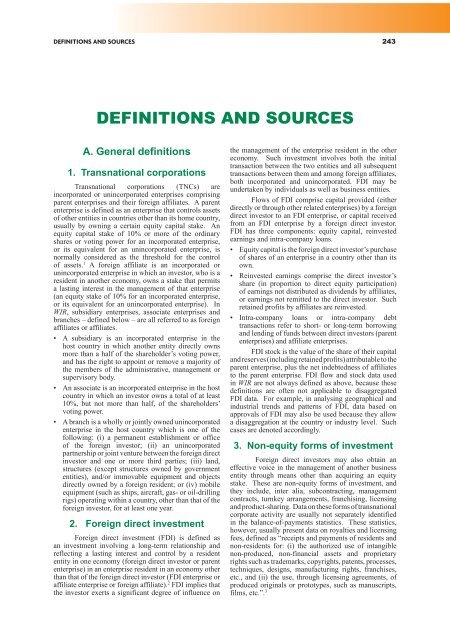World Investment Report 2009: Transnational Corporations - Unctad
World Investment Report 2009: Transnational Corporations - Unctad
World Investment Report 2009: Transnational Corporations - Unctad
You also want an ePaper? Increase the reach of your titles
YUMPU automatically turns print PDFs into web optimized ePapers that Google loves.
DEFINITIONS AND SOURCES 243<br />
DEFINITIONS AND SOURCES<br />
A. General definitions<br />
1. <strong>Transnational</strong> corporations<br />
<strong>Transnational</strong> corporations (TNCs) are<br />
incorporated or unincorporated enterprises comprising<br />
parent enterprises and their foreign affiliates. A parent<br />
enterprise is defined as an enterprise that controls assets<br />
of other entities in countries other than its home country,<br />
usually by owning a certain equity capital stake. An<br />
equity capital stake of 10% or more of the ordinary<br />
shares or voting power for an incorporated enterprise,<br />
or its equivalent for an unincorporated enterprise, is<br />
normally considered as the threshold for the control<br />
of assets. 1 A foreign affiliate is an incorporated or<br />
unincorporated enterprise in which an investor, who is a<br />
resident in another economy, owns a stake that permits<br />
a lasting interest in the management of that enterprise<br />
(an equity stake of 10% for an incorporated enterprise,<br />
or its equivalent for an unincorporated enterprise). In<br />
WIR, subsidiary enterprises, associate enterprises and<br />
branches – defined below – are all referred to as foreign<br />
affiliates or affiliates.<br />
�� A subsidiary is an incorporated enterprise in the<br />
host country in which another entity directly owns<br />
more than a half of the shareholder’s voting power,<br />
and has the right to appoint or remove a majority of<br />
the members of the administrative, management or<br />
supervisory body.<br />
�� An associate is an incorporated enterprise in the host<br />
country in which an investor owns a total of at least<br />
10%, but not more than half, of the shareholders’<br />
voting power.<br />
�� A branch is a wholly or jointly owned unincorporated<br />
enterprise in the host country which is one of the<br />
following: (i) a permanent establishment or office<br />
of the foreign investor; (ii) an unincorporated<br />
partnership or joint venture between the foreign direct<br />
investor and one or more third parties; (iii) land,<br />
structures (except structures owned by government<br />
entities), and/or immovable equipment and objects<br />
directly owned by a foreign resident; or (iv) mobile<br />
equipment (such as ships, aircraft, gas- or oil-drilling<br />
rigs) operating within a country, other than that of the<br />
foreign investor, for at least one year.<br />
2. Foreign direct investment<br />
Foreign direct investment (FDI) is defined as<br />
an investment involving a long-term relationship and<br />
reflecting a lasting interest and control by a resident<br />
entity in one economy (foreign direct investor or parent<br />
enterprise) in an enterprise resident in an economy other<br />
than that of the foreign direct investor (FDI enterprise or<br />
affiliate enterprise or foreign affiliate). 2 FDI implies that<br />
the investor exerts a significant degree of influence on<br />
the management of the enterprise resident in the other<br />
economy. Such investment involves both the initial<br />
transaction between the two entities and all subsequent<br />
transactions between them and among foreign affiliates,<br />
both incorporated and unincorporated. FDI may be<br />
undertaken by individuals as well as business entities.<br />
Flows of FDI comprise capital provided (either<br />
directly or through other related enterprises) by a foreign<br />
direct investor to an FDI enterprise, or capital received<br />
from an FDI enterprise by a foreign direct investor.<br />
FDI has three components: equity capital, reinvested<br />
earnings and intra-company loans.<br />
�� Equity capital is the foreign direct investor’s purchase<br />
of shares of an enterprise in a country other than its<br />
own.<br />
�� Reinvested earnings comprise the direct investor’s<br />
share (in proportion to direct equity participation)<br />
of earnings not distributed as dividends by affiliates,<br />
or earnings not remitted to the direct investor. Such<br />
retained profits by affiliates are reinvested.<br />
�� Intra-company loans or intra-company debt<br />
transactions refer to short- or long-term borrowing<br />
and lending of funds between direct investors (parent<br />
enterprises) and affiliate enterprises.<br />
FDI stock is the value of the share of their capital<br />
and reserves (including retained profits) attributable to the<br />
parent enterprise, plus the net indebtedness of affiliates<br />
to the parent enterprise. FDI flow and stock data used<br />
in WIR are not always defined as above, because these<br />
definitions are often not applicable to disaggregated<br />
FDI data. For example, in analysing geographical and<br />
industrial trends and patterns of FDI, data based on<br />
approvals of FDI may also be used because they allow<br />
a disaggregation at the country or industry level. Such<br />
cases are denoted accordingly.<br />
3. Non-equity forms of investment<br />
Foreign direct investors may also obtain an<br />
effective voice in the management of another business<br />
entity through means other than acquiring an equity<br />
stake. These are non-equity forms of investment, and<br />
they include, inter alia, subcontracting, management<br />
contracts, turnkey arrangements, franchising, licensing<br />
and product-sharing. Data on these forms of transnational<br />
corporate activity are usually not separately identified<br />
in the balance-of-payments statistics. These statistics,<br />
however, usually present data on royalties and licensing<br />
fees, defined as “receipts and payments of residents and<br />
non-residents for: (i) the authorized use of intangible<br />
non-produced, non-financial assets and proprietary<br />
rights such as trademarks, copyrights, patents, processes,<br />
techniques, designs, manufacturing rights, franchises,<br />
etc., and (ii) the use, through licensing agreements, of<br />
produced originals or prototypes, such as manuscripts,<br />
films, etc.”. 3

















